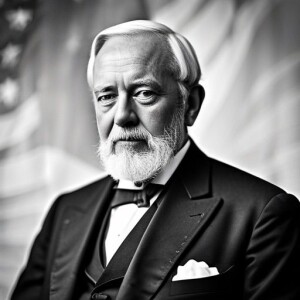Step right up and meet Benjamin Harrison, the 23rd President of the United States! Born into a family of political powerhouses in North Bend, Ohio in 1833, Harrison had big shoes to fill as his grandfather, William Henry Harrison, was also a U.S. President, though his tenure was cut short after just one month due to an untimely death.
Nevertheless, Harrison was determined to make his own mark. He studied law at Miami University in Ohio and began his political career in Indianapolis, Indiana. When the Civil War broke out, he served in the Union Army and rose to the rank of brigadier general before returning to his legal career and diving headfirst into Republican Party politics.
Harrison’s dedication and hard work paid off when he was elected to the U.S. Senate from Indiana in 1881, a position he held until 1887. In 1888, he clinched the presidency, promising to focus on increasing tariffs and promoting economic growth. And he did not disappoint! Harrison signed the McKinley Tariff Act of 1890, which helped to boost the economy, and the Sherman Antitrust Act, which aimed to prevent monopolies and promote fair competition.
But Harrison’s presidency was not without controversy. One of his notable actions was the support for the construction of the first federal immigration station on Ellis Island, which opened in 1892. However, the Lodge Bill, which would have authorized the federal government to oversee elections in the South and prevent voter suppression of African Americans, was defeated in the Senate. Furthermore, the economy experienced a severe downturn during his presidency, leading to criticism of his economic policies.
Despite these challenges, Harrison’s commitment to promoting economic growth and competition through tariffs and antitrust laws paved the way for future success. After losing his bid for re-election in 1892, Harrison returned to practicing law and remained active in Republican Party politics until his death in 1901 at the age of 67. He may have had his ups and downs, but Benjamin Harrison will always be remembered as a President who fought for what he believed in.

